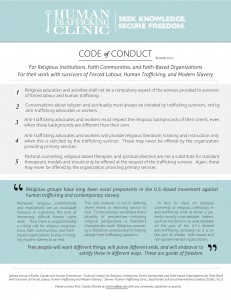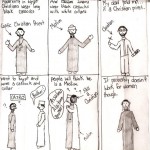 “There’s a term in the Korean community, Rice Christian; they become nominal Christians because they have benefited from a Christian organization or Christian friends, and they feel that somehow to return the favor because something wonderful has been done for you (and you can’t imagine anything more wonderful to be done for you than be rescued from a brothel, where you’ve been forced to engage in prostitution 25, 30 times a day), you owe a lot.“
“There’s a term in the Korean community, Rice Christian; they become nominal Christians because they have benefited from a Christian organization or Christian friends, and they feel that somehow to return the favor because something wonderful has been done for you (and you can’t imagine anything more wonderful to be done for you than be rescued from a brothel, where you’ve been forced to engage in prostitution 25, 30 times a day), you owe a lot.“
Part Two of an interview with
Claude d’Estrée
Buddhist Chaplain and head of the Human Trafficking Clinic at the University of Denver
Claude d’Estrée wants to make sure that people aren’t joining a church in exchange for being helped. So he and colleague Yvonne Zimmerman proposed a Code of Conduct for organizations fighting human trafficking. At least one part of this code, d’Estrée says, has become controversial, namely:
The primary service organization must not provide religious literature, training, and instruction.

In other words, if you’re a Christian (or Muslim, or Buddhist, etc.), and you’re on a mission to fight human trafficking, and someone you’re helping asks you about your faith, you have to outsource the answer. The dispute comes from some humanitarian groups, who find this guideline too strict, and say it demotivates them from mission work. Meanwhile, human rights observers have said the rule protects freedom of religion.
D’Estrée is certainly not the first to propose a code of conduct for humanitarian missions; the International Federation of the Red Cross and Red Crescent Societies developed one twenty years ago. Some faith-based NGOs, like Lutheran World Relief, are signatories to the ICRC standards. Many are not.
But codes of conduct, in general, are not universally applauded. Nick Leader at the Overseas Development Institute has raised questions both about the enforcement of codes of conduct, and also whether they stifle otherwise good work:
they might reduce innovation and experimentation and make agencies refuse to work if they fear they cannot uphold standards for good reasons beyond their control
And certain Christians, particularly Evangelicals, have engaged d’Estrée and his colleagues in a repartée about their work. One of their major objections was to anthropologist Laura Agustín’s longtime suggestion that anti-sex trafficking efforts are colonialist and a “Rescue Industry” (an idea which neither d’Estrée nor Zimmerman necessarily endorse).
The debate over codes of conduct in human trafficking really is just one instantiation of a larger question: How much religious adherence originates in a quid pro quo? How often do vulnerable people join a faith community because it provides them with food, clothing, the ear of a listening pastor, a social life, a potential spouse, or something else? And how often, if ever, do they join because of a genuine, socially-binding spiritual transformation? I don’t know the answer to this question, brilliant people have been musing on it for 150 years, and we’re not going to solve it here. But we might make a little bit of headway by talking to d’Estrée, because he’s been “on the ground” around the world for two decades, does not identify as a Christian, and has been working against human trafficking and observing the actions of faith-based NGOs. His anecdotes might give us some insight into if, how, and when these groups are sharing their beliefs. So I first asked him:
Have you ever seen an NGO violate your proposed Code of Conduct?

1) Religious education and activities shall not be a compulsory aspect of the services provided to survivors of forced labour and human trafficking.
2) Conversations about religion and spirituality must always be initiated by trafficking survivors, not by anti-trafficking advocates or workers.
3) Anti-trafficking advocates and workers must respect the religious backgrounds of their clients, even when these backgrounds are different than their own
4) Anti-trafficking advocates and workers will provide religious literature, training and instruction only when this is solicited by the trafficking survivor. These may never be offered by the organization providing primary services.
5) Pastoral counseling, religious based therapies, and spiritual direction are not a substitute for standard therapeutic models and should only be offered at the request of the trafficking survivor. Again, these may never be offered by the organization providing primary services.
There was a large church organization, who spent a lot of time educating a pastor, then finding a core group within the church who wanted to take on human trafficking. And then they went out and looked for a place in the world to do this. In this case it was Thailand. One of my graduate students, at the Human Trafficking Clinic, was also a member of this church. I suspected there would be some issues when, at one point, one of them said he was going to preach on the topic, and I was disinvited from attending.
This was no personal issue between you two?
No. We’d had all these friendly conversations going for many, many hours.
What did happen was that at any given time, about 30-40 percent of the students in this clinic would identify themselves as Evangelical Christians. And yet, they would, in conversation, separate themselves out from a very large portion of the dominant scene in Evangelical Christianity. I would identify them as what I call liberal Evangelical Christians — that is, liberals in social justice values. So the church went off and decided to free these girls from a brothel. I wasn’t with them at this point.
After the students reported to me what had got on in the church service afterwards, it set my teeth on edge. Two theological premises came out of this. One was a sense that we are going to save these girls from the brothels — which is all good — but it was wrapped up in the concept that these girls are sinners. Of course we are all sinners, but there must be something special about them because otherwise they may not have been caught up in the whole process. And one of the students felt that what this was implied was because they did not have Jesus in ttheir lives.
The second piece was even more disturbing to me: Doesn’t God operate in mysterious ways, that he would put these girls in a situation so that we would have the opportunity to free them and bring them to God’s Jesus? That really starts me fuming. Smoke starts coming of my ears, my teeth are grinding at that point.
So they go off to Thailand, and they identify a brothel. They make a choice not to work with the local police on the assumption, maybe correct, that they are corrupt, and that they’re going to free these girls on their own, which they manage to do, and then bring them in for rehabilitation, without really having thought through what kind of therapy they’d be needing or job skills they were going to learn. That’s not actually a huge mistake because small faith-based NGOs do this on a regular basis and learn from their mistakes.
But the third thing was an email that I got back from a student in their church. It was even more disturbing, for two reasons. She really was deeply upset that part and parcel of their recovery was Bible study and church service every morning — a requirement. And she believed these girls were being revictimized, by her own fellow church members. Even more disconcerting, this was causing some really deep questioning of her own faith tradition, watching her church impose its values on these girls.

Other times I have gone on and seen groups at work with girls and boys, and enquired what daily life was like. And I’d get mixed results. Sometimes they were offering hospital care, but rarely psychological care, one of the most desperate needs. I understand that can be very difficult because if you’re going to offer psychological care you have to be culturally sensitive and find people who can do that. Sometimes they would substitute faith-based therapeutic psychological modalities for secular or more normative forms. So it’s sort of a mixed bag. Sometimes it would be not so much it would not be imposing Bible study or church services, but one-on-one conversations with the girls about how does one really turns one’s life around, and, of course, the best way is by being saved, last time I checked. [Update, March 18: d’Estrée expands on this in the comments below, which I encourage you to read.] It’s not that cookie-cutter.
How do you see the difference between proselytizing and evangelizing?
Proselytizing is taking somebody in a weakened physical, mental, or potentially spiritual state — just about anyone who is a victim or survivor of trafficking, whether under or over the age of 18 — and whether they are making rugs, or bricks, or in a brothel — and using that weakened state to impose one’s religious values.
Evangelizing is waiting for the question from the other person, who is interested in you because you somehow exude something. They want to know what that something is, and it becomes an opportunity to give witness to one’s faith. Which is a perfectly reasonable thing to do, especially within in a Christian context. It wouldn’t work within the Buddhist context — we don’t do that.
It’s another thing to take the opportunity to express all the wonderful values you might find in your faith tradition to someone who’s in this weakened state. That’s why, if you look at the guidelines, the first three are really clear that the discussion has to be initiated by the trafficking survivors. What will probably capture people’s attention here is #4 and #5. To make sure there’s no conflict of interest, if you’re a faith-based organization, when a survivor even asks for information, you should be referring them to some other religious organization for doing that. That makes it clear that that’s not your primary purpose for being there. So the roles do not get confused. [Ed.’s note: italicized for emphasis]
Are these sensitivities that NGOs should be having?
I think so.
Are they trained in this?

No. They’re not. And, of course, is the added piece, when we say pastoral counseling, spiritual direction, and religious-based therapy, they’re not a substitute for the standard therapeutic model. There’s been a growth industry of people receiving counseling — what is supposed to be psychological counseling — but it’s biblically-based psychological counseling.
Christians would call that Christian counseling.
That’s different from pastoral counseling. We have these interesting gradations. We have those courses in Div School —
— if I recall, one of the pastoral counseling textbooks, in the first chapter, said it’s pretty much impossible to define pastoral counseling —
— you can’t dice these types of therapy up easily. I have no overarching prohibition against pastoral counseling, religious based therapies, or spiritual direction. Just understand that they’re not a substitute for the more normative forms of counseling.
You think these anti-human trafficking efforts should include more traditional secular or therapeutic —
Across the board, in NGO efforts, whether secular or faith-based, one of the failings is a lack of trained therapists of any kind. My Associate Director, Abigail Wolfe, is beginning to formulate the first comprehensive therapeutic modalities for victims of human trafficking.

Add to this the fact that some people consider some therapies — like psychoanalysis — religions in and of themselves.
We can drive this discussion to absurd lengths and declare all these kinds of things equal cosmologies or theologies under different names —
— or ways of manipulating a human mind —
— keep in mind, we’re always insisting that it is survivor-initiated — that it is empowered by this person.
How have groups that you have observed as prosletyzing reacted to your Code of Conduct?
Not well. I should have predicted this. The religious groups that don’t do this have no problem with it. The ones that are violating it have strong disagreement on many different layers. One is what you just suggested, which is to say that secular forms of therapy are providing a kind of normative values no different than if it were Christian-based.
All I’m really asking you to do is examine your motivation and intentionality here. Which comes first — your desire to save souls, or to offer a person freedom of choice?
A lot of Christians would say that you’re not truly free until you become a Christian.
I understand that. I gave a talk at Yvonne [Zimmerman]’s seminary, and I challenged the students there, and said which is really more important — freeing someone from the bonds of slavery, or saving their immortal soul? And when push comes to shove, it’s the latter.
But also, from a Buddhist perspective, I would think that one would have a little bit more faith in the power of God or Christ to say once having been given the psychological aspect, and I’m here to bear witness to my faith, that’s why I did this, at that point you might have enough faith to have that that person might be interested enough to ask, why did you come here 1000 miles? What motivated you to do this?
Then they have the ability to trust the other soul, as it were, to come into the light more, to make the right decisions. That’s the nexus of real freedom, right? A person makes a real, personal completely free choice to accept Jesus. There’s a term in the Korean community: “Rice Christian”; they become nominal Christians because they have benefited from a Christian organization or Christian friends, and they feel that somehow to return the favor because something wonderful has been done for you (and you can’t imagine anything more wonderful to be done for you than be rescued from a brothel, where you’ve been forced to engage in prostitution 25, 30 times a day), you owe a lot. There’s no doubt about that. And young people perceive this as: one of the things I can do best to say thank you is to agree to follow this faith tradition.
So it’s a quid pro quo almost?

Yeah. And if you’re a religious organization, you have to be really on guard against that. You really want this person to come to Christ on their own volition, not as a way of saying thank you to you — maybe, as a way of saying thank you to God. Very big difference.
I was taught as kid: when you went into confession, they were trying to get you to say the perfect act of contrition. And it was not saying, I’m sorry I did these things because I’m worried about suffering in Hell. Rather, I’m sorry because I hurt God’s feelings. I think that any faith-based organization has to be that much more on-guard that it’s not a quid pro quo.
How do you react to Laura Agustín’s analysis? The word that she used is colonialism.
I know. [Update, March 18: Agustín responds in the comments below, which, again, I encourage you to read.]
Would you be willing to use it, in any context, that you’ve seen, on the ground, would you say that anti-trafficking efforts have exhibited anything akin to colonialism?
Across the board? No. I have seen aspects in which it kind of smacks of that on the ground. Individuals who are bringing a hegemonic view, it tends to be, quite frankly: people who are unsophisticated, who have not spent much time in other people’s cultures and have a lack of apprecation for the cuture they’re in. Most groups who want to stick it out in another culture or country, and are willing to take the time, are not just sort of sending out missionaries every 6 months to replace each other, but give them time to settle in. They go through some remarkable internal changes about how to work with that population. If there’s something like colonialism, it’s very unconscious.
One component of the idea of colonialism is economic investment. Is there any way in which anti-human trafficking activities is an industry?

Quite frankly, there’s so little money for everyone available for all of us trying to do this work. I complain because all the rescue and recovery groups are getting this money, but research is not getting anything. But the reality is, put together all these anti-trafficking organizations, secular or faith-based, and you couldn’t buy yourself a destroyer. So yes, any time some human rights issue comes up, it becomes a bit of a growth industry. People say, I could get a piece of this action, I could get a piece of the money… and there will always be people who get it and are not qualified to do that. You read a book, you took a two hour seminar, and you managed to get a massive grant from the US government to work on human-trafficking in Houston or wherever. You were smart enough to find out there’s a pot of money, and if you present yourself in the right way, you’ll get a piece of that action.
Can you make anti-human-trafficking into a sustainable business for you as a small organization or maybe even a church group from pulling in donors from private donations or the federal government? Sure. But I wish it were big enough that I could start being concerned as a form of business colonialism. I’d love it if there was that much money involved. I’m being slightly facetious.












